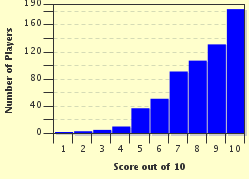Quiz Answer Key and Fun Facts
1. We begin our history with the Franks, whose king led them out of what is now Belgium and expanded Frankish influence southeast past the Rhine, and south to the Pyrenees. By 510 AD this king, having converted to Catholicism, maintained an independent kingdom surrounded by Saxons, Goths, Vandals and Slavs. What was the name of this Frankish king?
2. Unfortunately for the early Frankish kings, they let real power slip from their hands and into the hands of their aristocracies. These "long-haired" kings, so-called because of their uncut locks, passed into oblivion when the last of their line was shorn and carted off (literally) to a monastery. What is the name of this dynasty which Dan Brown mentions in "The Da Vinci Code"?
3. In 751 Pepin the Short, the Mayor of the Palace, replaced one monarchy with another, this time with himself as king. However, his dynasty was made more famous by his son, who was crowned "Emperor of the Romans" by Pope Leo III in Rome on Christmas Day in 800 AD. Who was this King-made-Emperor, whose name means Charles-the-Great?
4. Charles-the-Great's Empire eventually fell apart. His grandsons split the Empire three ways into what would later become France, Germany and a central strip based on Burgundy and what ultimately became Belgium and the Netherlands. This division was agreed in 843 AD by the "Treaty of __________________." (Hint: "First World War, anyone?")
5. After the Carolingian Empire fell apart, what was to become modern France degenerated into internecine squabbling. In 987, however, a new leader was elected by assembly to be "King of the Franks." It took a few generations for the warring nobles to recognize the sovereignty of his kingship. What was this new king's name and what was the name of the dynasty he founded?
6. By 1180, French King Philip II was at war with the English King Henry II, who held extensive territories in France (including Anjou and Normandy). To retain his crown, Philip allied himself with Henry's own son to fight the English King. However, Henry's son eventually became King of England himself, and after crusading with Philip, turned against him. What is the name by which we know this crusading soldier-king, the son of English king Henry II?
7. My name is King Louis IX. I reigned from 1226 to 1270. I am also a Saint of the Roman Catholic Church.
8. Speaking of religion, I, Clement V, having been elected Pope and being French, declined to move to Rome to rule the Church. Instead I settled in a French city in 1309, and there the Papacy remained for 67 years. Which French city did the new Pope move to?
9. In 1337, English King Edward III decided he had had enough of the French Kings ripping off what had been hereditary English territory, and a French break in the line of succession gave him the opportunity to settle English claims to the French throne. Philip VI, who had declared his family line, the Valois, the new French royal house, took umbrage. If it was war the English wanted, well, war they would get! What war was this?
10. It is now 1494 and France is ruled by Charles VIII. He sees prestige and territory to be gained from his rival, the Holy Roman Emperor, in a nearby European peninsula ruled by many squabbling city-states. Which peninsula was this?
Source: Author
snediger
This quiz was reviewed by FunTrivia editor
bloomsby before going online.
Any errors found in FunTrivia content are routinely corrected through our feedback system.

